All living organisms have an internal biological clock called the circadian clock that controls various physiological functions such as the sleep/wake cycle, eating, digestion and metabolism, as well as body temperature and the release of hormones.
[the_ad id=”14222″]
It usually resets every 24 hours and is regulated by a cluster of nearly 20,000 neurons (nerve cells) called the suprachiasmatic nucleus located in the hypothalamus at the base of the brain.
Circadian rhythms are the body’s natural sleep and waking cycle that take cue from the day and night cycles. Our circadian rhythms form the basis of our general sleep/wake cycle and can differ from person to person, hence some people tend to be the “early to bed early to rise” type, while others are “night owls” and sleep in until later in the morning.
In the sleep/wake cycle of a healthy person, when the sun rises, the body produces cortisol which makes us feel awake and alert, and as the sun sets and night falls, the pineal gland releases melatonin, a hormone that causes sleepiness.
The circadian rhythms in newborn infants do not develop until they are a few months old, this is why babies tend to have irregular sleep patterns for the first few months of their lives.
During teenage years, the circadian rhythms experience a shift known as sleep phase delay when melatonin rises much later in the night and may cause the need to sleep in until later in the morning.
In healthy adults, circadian rhythms remain fairly stable if a proper sleep pattern is followed, while in older adults, circadian rhythms evolve and change which may lead to them sleeping and waking earlier.
Oftentimes, our circadian rhythms become disturbed due to external factors, such as jet-lag and travel, work shifts and lifestyle habits.
It is therefore, obvious that a disturbed circadian clock will result in poor sleeping patterns, which will ultimately impact our general health and wellbeing.
Understanding your circadian rhythms can help you to improve your quality of sleep, and knowing how to work with the natural flow of your circadian clock can help you to regulate your sleep cycle to get the most out of your sleep time.
Maintaining a regular sleep/wake pattern: The habit of sleeping and waking at a regular time will help you to reset your circadian rhythm as your body will learn and adjust to your sleep schedule. Therefore, people who are unable to fall asleep at a particular time, or those who have had their sleep cycles disturbed, are advised to wake up at a regular time in the mornings to help reset and regulate their circadian rhythms.
Understanding how light affects sleep: Exposure to light can reorient or disturb your circadian rhythms because the brain thinks it is daytime, therefore, it is time to be awake. For this reason, to get optimal sleep, you should avoid the use of devices such as mobile phones, computers and televisions, and maintain a fairly dark sleeping space.
Exercise and sleep: Exercise and sleep go hand-in-hand; thus, proper exercise can help to improve sleep quality. Additionally, aerobic exercise also impacts our metabolism and the release of hormones such as adrenaline and cortisol.
Exercise helps us to relax and reduces the time it takes for us to fall asleep (sleep onset). It also aids slow wave sleep which is the state of deep sleep where the body and brain rejuvenate. On the other hand, exercise can also help us to stay awake and alert, therefore, it is advisable not to exercise within 1-2 hours before your bedtime.
The right body temperature for sleep: Thermoregulation (the mechanism that manages body temperature) is strongly linked to circadian rhythms. Thermal environment plays an incredibly important role in regulating sleep since core body temperature works along with the sleep/wake cycle.
Core body temperature drops during the nocturnal sleep phase and rises during the waking phase within the 24-hour cycle of the circadian clock. It is seen that people suffering from insomnia tend to have a core body temperature increase and decrease that are not in sync with their sleep time.
Sleep, therefore, occurs when the core body temperature decreases, so it is important to maintain a cool and comfortable sleeping environment. The ideal temperature for good sleep is usually between 15 °C – 19 °C (60-67 degrees Fahrenheit), however, the key is to find the ideal temperature for you.
Understanding how our circadian rhythms impact our sleep patterns can help us to make smart changes to our routine for better sleep. Our circadian clock is a complex mechanism that governs important functions in our body, and maintaining the right balance within this mechanism is a crucial step to overall health – it all begins with getting a good night’s sleep!
Source:

Sudha Joshi Betarbet
Health Editor
